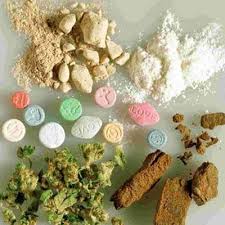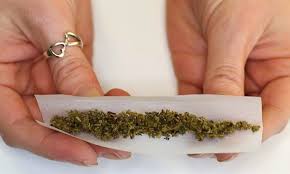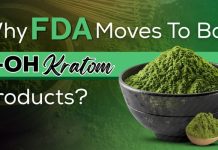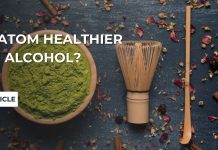Kratom is a South East Asian plant related to coffee, both are members of the Rubiaceae family. Kratom has been used for centuries in Malaysia, Thailand, Indonesia and some other Asian regions, but in the past decade or so it has become more and more popular in the United States and elsewhere.
Initially, it was known as a natural remedy for chronic pain that was also used in some cases to wean off opiates and opioids.
Myths About Kratom #1: Is Kratom A Synthetic Or Designer Drug?

As kratom became more well known and popular in the Western world it also became a target for disinformation, misinformation, and myths.
When digging for information about kratom, it’s important to make sure that what you’re reading is based on actual scientific fact or at least anecdotal reports rather than discredited studies, rumors or misleading information.
Despite the fact that several scientists, medical professionals, and researchers have long been advocating for the continued legality of kratom, the rumors and untruths about kratom continue to spread in certain circles.
In this article, we’re going to tackle six biggest myths about kratom strains and explaining the truth behind the falsehoods. Vendors consider it their responsibility to educate consumers and busting these myths.
One of the major myths about kratom is that it is a synthetic or designer drug. One reason for this myth is that around the time that kratom began to grow in popularity the “bath salts,” “plant feeder” and “incense” craze was in full swing.
Several years ago, synthetic and designer drugs, many of the analogs of illegal substances, were available to buy online and in head shops, convenience stores, gas stations and elsewhere. Several of them were cathinones, related to the stimulant plant khat.
The “bath salt zombies” stories were often connected to these dangerous “legal highs.” Analogs of ecstasy (MDMA) were sold as “plant feeder” and cannabinoid products were sold as “fake weed” often referred to as “incense.”
When these analog substances flooded the market state legislatures jumped into action to prevent people from selling and possessing these substances. At the time, often kratom or kratom extracts containing high percentages of mitragynine and 7-hydroxy-mitragynine were being sold on the shelves alongside these dangerous, synthetic designer drugs.
As a result, the laws on the books in states like Tennessee and elsewhere sometimes passed “blanket bans” related to “synthetic” substances while naming the compounds found in kratom.
Kratom is a plant product that in the US is generally found as a dried leaf powder. As a result, it is completely organic, as opposed to synthetic.
Luckily in Tennessee, the law was finally adopted when the fact that the law referring to kratom components was specifically related to “synthetic substances.” Technically, the active components in kratom could be synthesized.
The result is similar to the difference between ground and roasted coffee beans versus pure synthesized caffeine powder.
As with the case of caffeine anhydrous, many of the nutritional and other benefits of the pure plant product are lost when the active compound(s) are synthesized.
Myths About Kratom #2: Is Kratom Addictive?

Kratom is used for a wide variety of reasons, from depression and anxiety to sleep support or as an energizer like coffee.
One reason that kratom is used by some people is to kick opiates and opioid-based medicines or illicit opioids.
As a result, some would assume kratom itself must be just as addictive as in the case of methadone, Suboxone or other “opioid replacement drugs.”
In the case of methadone and suboxone, the withdrawal and addictive quality of the drugs sometimes mirrors or exceeds that of some opiate or opioid medications.
Kratom, like coffee, can be habit-forming. Also like coffee, caffeine can result in building tolerance. The more coffee you use the more your body becomes accustomed to caffeine and the more caffeine it takes to receive the same results.
With kratom, coffee or most any substance, there is often a less is more principle that applies. That says, despite kratom being somewhat habit forming, it does not result in serious withdrawal side effects like opiates and opioids.
According to several researchers including Dr. Edward Boyer and Dr. Jack Henningfield kratom is no more addictive or habit-forming than coffee. The side effects of caffeine withdrawal and kratom withdrawal are similar and can result in sluggishness, headache and sometimes a stuffy nose.
That said, as we mentioned earlier, extracts (like caffeine pills) are more likely to result in tolerance building quickly, so sticking with pure kratom powder is often best.
Mytha About Kratom #3: Kratom Is Bad For Your Health
Another bit of dangerous disinformation that makes the rounds about kratom is that it is dangerous, or even potentially deadly. The FDA and DEA have relied on what Johns Hopkins University professor and former head of the National Institute of Drug Abuse (NIDA) Dr. Jack Henningfield has referred to as “junk science” in an attempt to smear the plant.
At one point the number of emergency room calls were brought up. Some 660 calls were made regarding kratom in a period of several years. Meanwhile, there are about 100,000+ calls to emergency rooms and poison control centers for acetaminophen each year.
Over 100,000 calls to emergency rooms and poison control centers for caffeine and energy drinks and other over-the-counter products.
The FDA even tried to claim that kratom was responsible for several deaths. That claim was debunked by molecular biologist Dr. Jane Babin along with forensic toxicology consultant Dr. Karl Ebner.
As it turns out, there were other factors in each death that coroners had attributed to kratom that is known to cause fatalities, in most cases, it was a combination of pharmaceuticals that are known to be dangerous.
As is, researchers have attempted to induce death in laboratory rodents and other lab animals by intravenously injecting them with mitragynine and 7-ho-mg. In short, unlike caffeine which is responsible for overdose deaths each year, kratom has never been causally linked to death in humans or lab animals.
Myths About Kratom #4: Kratom Has Not Been Studied Or Researched

Kratom has been written up in the annals of Western science and medicine literally for centuries now. It was first discovered in the West in the 1800’s.
By the early 1900’s scientists were working on isolating and synthesizing the primary constituents.
Since then, pharmaceutical companies in Europe, the US, and Asia have studied kratom as well as the researcher Dr. E.J. Shellard who did a great deal of research on mitragyna speciosa in the 70’s.
In the last decade or so the interest in researching kratom has exploded. Hundreds of studies have been published in the last couple years alone as you can see by doing a search of research journals at http://scholar.google.com and searching for Mitragyna speciosa.
Myths About Kratom #5: Kratom Has No Health Benefits
Kratom is not just an alternative painkiller. Research shows that it may have benefits for those with anxiety, PTSD, depression, fibromyalgia.
In addition, it’s even been shown to have potential anti-cancer benefits and may also be chemo-preventative. Kratom has more antioxidant potential than green tea and is also anti-bacterial, anti-viral and is an immuno-stimulant.
As mentioned previously, there are hundreds of studies in just the past decade alone related to kratom and in more recent years more and more scientists and researchers agree that kratom may have several interesting benefits that are worth researching further to understand more clearly.
Myths About Kratom #6: Kratom Is Potentially Deadly

One of the latest smears from the FDA involves trying to claim that the plant is deadly. Kratom, as mentioned before, is related to the coffee plant by way of the Rubiaceae family.
Unlike the active ingredient in coffee, caffeine, however, none of the active compounds in kratom have been found to be lethal. Every year there are people who die from caffeine overdoses, generally from taking caffeine pills or other extracts.
Kratom, on the other hand, has never resulted in a dead even in laboratory conditions where the researchers were attempting to induce death by overdose by intravenously injecting the active compounds mitragynine and 7-hydroxy-mitragynine in laboratory animals like rodents.
If no amount of the compounds in kratom can kill a rat weighing a few ounces, the likelihood of a human being able to die is even more unlikely.
The FDA’s claim that kratom had been linked to multiple deaths is due to the fact that there have been people who had kratom in their system at the time of death.
The molecular biologist Dr. Jane Babin and forensic toxicologist Dr. Karl W. Ebner debunked the claims of death by showing other factors that were ignored in the coroner reports such as potentially lethal interactions of prescription medications.
Kratom is a lifesaver for many people, that said, there are definitely people who are either completely misguided and in the dark about the truth regarding kratom or intentionally misleading.
It’s always important to fully research any herb or supplement or medicine before you take it. Nothing is complete without risks, but based on the studies and hundreds of years of use, kratom can be especially helpful for some folks when used in moderation.








